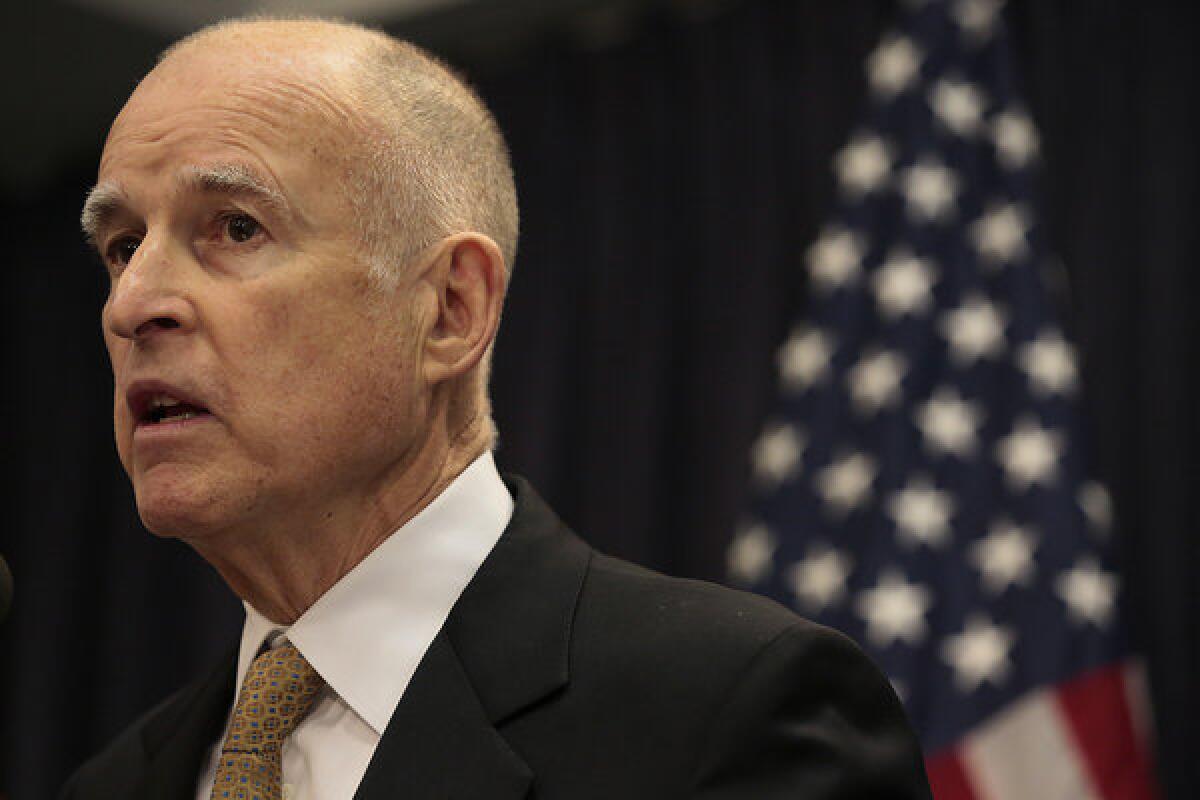Brown scores by taking on feds and felons

SACRAMENTO — You’ve got to appreciate a governor who stands up and says: “This is not a game. And I didn’t come here — I’ll be 75 in April — just to screw around.
“I’m trying to fix this state that has been screwed up for a long time. And we’re fixing the money problem. We’re fixing the prison problem.... California is a powerful state. We can run our own prisons. And by God, let those [federal] judges give us our prisons back.”
And at another point he puts an exclamation on it: “We don’t have a lot of money. We’ve got to pay down the wall of debt. We have uncertain economic times. We can’t pour more and more dollars down the rathole of incarceration.”
For starters, you’ve got to appreciate Gov. Jerry Brown as an entertainer. During a lengthy news conference Tuesday he gestured, defied and ranted. No talking points, at least none that he read. It was all ad lib and in non-government speak. Regular, understandable folk English.
California has had other entertaining governors, but they were professional entertainers out of Hollywood who didn’t possess — and couldn’t articulate — nearly the depth of policy substance that Brown has acquired over the decades.
You’ve also got to appreciate the governor who says he’s not playing “a game” — but is performing as one of the all-time best political players. He’s going on 75 but hasn’t lost his eye for a fat pitch that can be slammed out of the park.
A state politician will score every time taking on federal judges and felons.
It’s an excellent example of good policy being good politics.
“There’s a negative public perception of prisons and prisoners,” Mark Baldassare, president and pollster of the Public Policy Institute of California, once told me. “Average voters don’t like to think of their money being spent on making conditions too comfortable.”
A Baldassare poll last year showed that 64% of Californians would be willing to pay higher taxes for K-12 schools and 54% for health and human services. But only 17% would dig deeper for prisons; 81% would object.
Brown put it this way Tuesday: “Look, everybody wants to send people to prison. Nobody wants to pay for it.”
California voters did, at least, side with common sense in November and approve Proposition 36, which will further reduce the prison population by relaxing the three-strikes sentencing law.
Another thing to appreciate about Brown’s news conference: His legitimate crowing about achievements. The chronically unbalanced state budget is nearing stability, thanks to significant spending cuts and the tax increase the governor talked voters into approving.
Now he’s trying to check prison overcrowding off the “to do” list.
“I’m here to announce that the prison emergency is over in California,” Brown began the news conference, never mind that federal courts will be the final judge on that. “The job is now complete.”
Actually, Brown appears to be correct.
In 2005, when federal courts began taking control of prisoners’ healthcare, state lockups were jammed to nearly twice the capacity they were built for.
Thousands of prisoners were stacked like cordwood in barracks, gyms and hallways, some triple-bunked. There was little room for exercise and rehab: education, job training and drug treatment. Recidivism rose to twice the national average.
“They had a good point,” Brown told reporters, referring to prisoner rights activists who sued the state. “The prison systems were screwed up. We’ve done a lot to fix them…. We’ve done it….They’ve actually beat down the state of California. We’ve shaped up. We’re standing at attention.”
“We’ve gone from a serious constitutional problem to one of the finest prison systems in the United States,” he contended. “Most of the people in prison get far better [healthcare] inside the prison than they’ll get once they’re released on the streets....
“And there’s something wrong, to me, when … most people don’t get as good of healthcare as they get in the prisons. And yet we’re told it’s bad.”
Brown said the number of inmates locked in state prisons has been reduced by 42,000 since 2007, down from 161,000 to 119,000.
More than half of the reduction is due to his “realignment” program — the shift of incarcerating newly convicted, low-level felons from state prisons to county jails. Brown’s tax increase guaranteed state funding for that landmark move.
The federal courts have ordered the state to reduce its prison population by an additional 9,000. The governor claims that isn’t necessary. He’s pleading for the federal judges to consider new evidence.
Those gyms no longer are clogged with bunks. They’re full of basketballs and hoops.
“Our prisons are not overcrowded,” he said. “Enough already!”
Federal control — which the governor called “very intrusive” — has been costing Sacramento billions.
The plaintiffs’ attorney fees alone are eye-openers: roughly $2.7 million in the last fiscal year, the Brown administration says. A court “receiver” draws an annual salary of $280,000. His office costs the state $80 million annually.
“The name of the game,” Brown told reporters, “is ‘Come to Sacramento and get your little piece of the pie.’
“Well, I’m the cook here and I’ve got to cut the slices in fair amounts. And I think we’ve cut a big enough slice for the prisons.”
Brown vowed to take his argument all the way to the U.S. Supreme Court if necessary. He should. And it should be entertaining.
More to Read
Start your day right
Sign up for Essential California for news, features and recommendations from the L.A. Times and beyond in your inbox six days a week.
You may occasionally receive promotional content from the Los Angeles Times.







